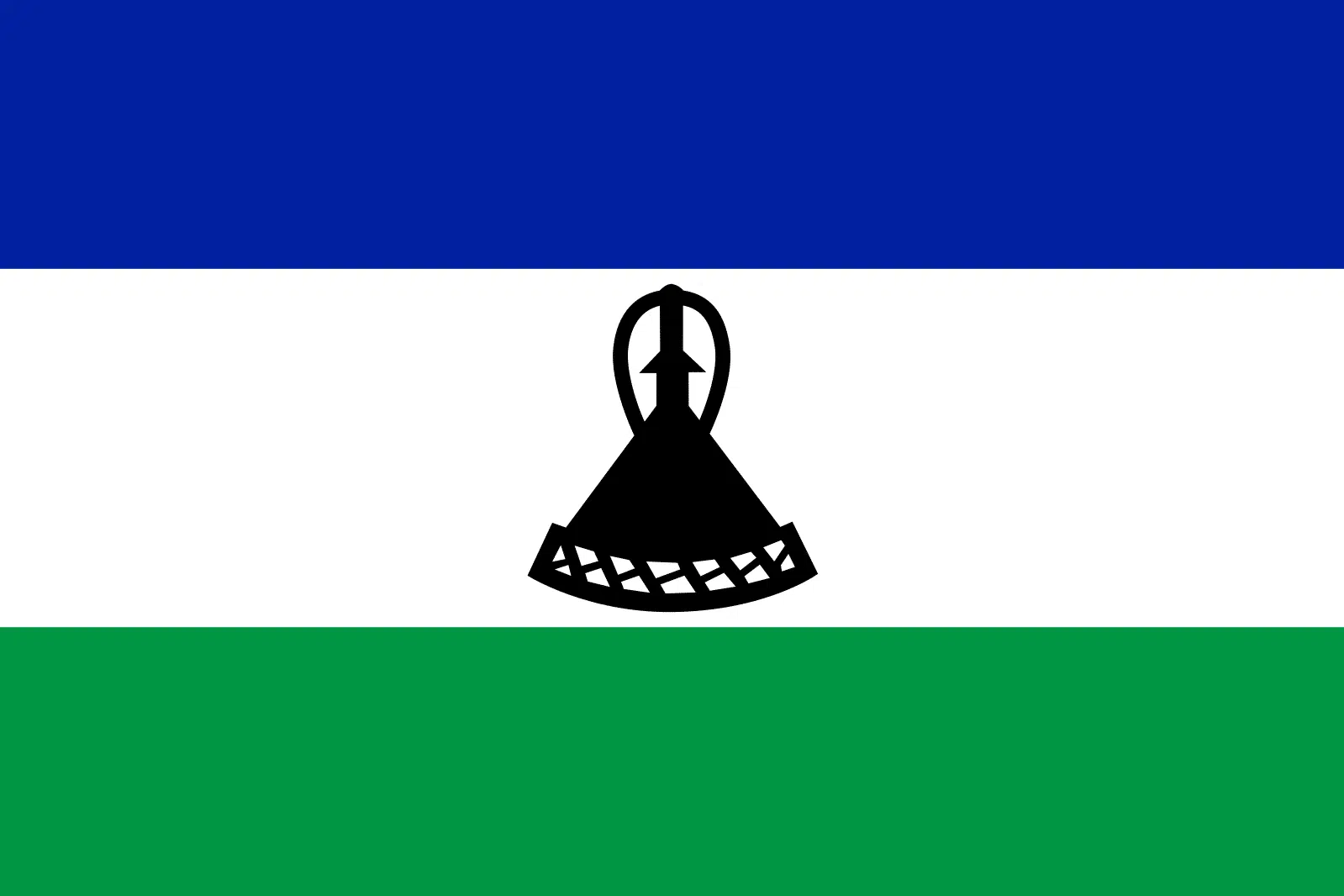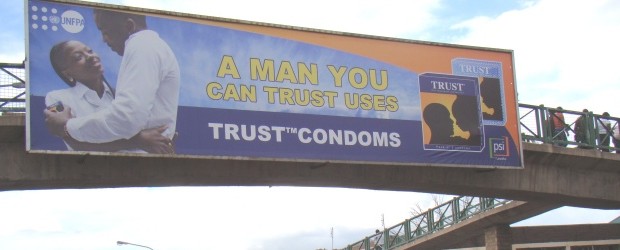Confronting Population Control in “The Kingdom in the Sky”


Lesotho, a small African nation about the size of Maryland and completely surrounded by the country of South Africa, is known as “The Kingdom in the Sky” for its high elevation and mountainous terrain. Like its beautiful landscape, the population was at one time sky-high with Basotho (the plural name of Lesotho citizens) women having an average of 5.8 children in 1975. That birthrate has now dropped to 2.8, and is projected to drop below the replacement level of 2.1 within the next ten years thanks in large part to the efforts of international population control organizations doing their best to destroy traditional family values in Lesotho.
When I visited Lesotho in February, it was hard not to notice the ceaseless work of the huge “family planning” and population control groups operating there. At the main traffic circle at the center of the city of Maseru, right across from Our Lady of Victory Cathedral, is a pedestrian bridge sporting giant “Trust Condom” billboards on both sides. The billboards (and the condoms) are sponsored by Population Services International (PSI) and the United Nations Population Fund (UNFPA). In many of the restrooms around the city (and in the airport), there are machines that dispense free condoms.
Other population control groups operating in Lesotho include Family Health International (FHI), the Population Council, and, of course, the United States Agency for International Development (USAID). These and other groups have spent a whopping $115 million on population control in Lesotho since 1990. To make matters worse, enforcement of Lesotho’s pro-life laws is almost nonexistent. In fact, the abortionists freely advertise in the newspapers, and “herbal doctors” can “help” a pregnant woman if she doesn’t want to go the surgical route.

Trust Condom ad sponsored by UNFPA and PSI.
Life expectancy in Lesotho is a dismal forty years, largely due to the high adult HIV infection rate of 24%, the third highest in the world, and the world’s fourth highest tuberculosis infection rate. Only about 6% of Basotho are above the age of 60, and there are 170,000 AIDS orphans. Virtually every family has been heavily impacted.
Bishop Augustinius Tumaole Bane, ordinary of the Leribe Diocese, whose brother and brother’s spouse both died of HIV leaving four orphans, says the huge rate of HIV infection is due to a drastic decline in morality, which is a direct result of the baleful influence of the West. He also says, “Catholicism has always played a big role in the lives of the people, but most of the people are Catholics only on Sundays. During the week they are inclined to their own traditional way of living. So there is a separation between the faith and the day to day.”
The current monarch, King Letsie III, plays a unifying role amidst all the diverse political parties and religions. He is Catholic, and he recently declared that he would no longer continue the royal tradition of polygamy. Because of his example of monogamy (and perhaps also because a wife costs 25 head of cattle), polygamy is declining in Lesotho.
On the Ground
When I arrived in Lesotho, Father Lawrence Tanki Motsi, O.M.I., and Sister Sophia Mabote met me at Lesotho’s Moshoeshoe International Airport after the 16-hour flight from New York, and we drove the short distance to the Mazenod Retreat Center, our home base for the week. Here, every day began with 6:45a.m. Holy Mass prayed in the Basotho language. In my travels around the world, I am always struck by how, even if you can’t understand a word that is being said, you always know exactly what is going on during the Mass.
Over a week’s time, myself and Emil Hagamu, Human Life International’s (HLI) regional coordinator for English-speaking Africa, talked to nearly a thousand priests, religious sisters, Catholic high school principals, doctors and nurses. In these talks, I discussed the population control agenda, the threat of homosexuality, abortion myths and the ineffectiveness of condoms at halting HIV/AIDS (sadly, very relevant to the situation in Lesotho). Some of the people (especially the medical professionals) were obviously already conditioned to accept abortion because of the influence of the population controllers. But when Emil showed the pro-life movie “The Hard Truth,” which presents in graphic detail the truth about abortion, the horror on their faces was plainly evident, although some were so hard-hearted it did not seem to affect them.
Ignoring the Will of the People ― As Usual
The population controllers and pro-abortionists are endlessly deceptive and tricky. Instead of trying to pass a conventional abortion legalization bill, which would immediately attract the attention of parliamentarians and the people, they buried their language deep in the new Penal Code. Few of the lawmakers actually read this voluminous document, preferring to trust the experts, attorneys and consultants to do the job right. This, of course, is exactly what the pro-abortionists want.
Section 45 (1) of the Penal Code begins promisingly enough: “A person who does any act bringing about premature termination of pregnancy in a female person with the intention of procuring miscarriage, commits the offence of abortion.”
So far, so good, right?
But then, Section 45 (2) provides a long laundry list of exceptions, including for the life and health of the mother, fetal birth defects (eugenics), rape and incest.
Of course, the “mother’s health” exception is defined by the World Health Organization as “a state of complete physical, mental and social well-being and not merely the absence of disease or infirmity.” So, while the population controllers claim that the Penal Code places strict limits on abortion, the reality is that it legalizes abortion for any reason whatsoever ― in other words, abortion-on-demand.
Interestingly, the Lesotho National Federation of Organizations of the Disabled came out strongly against Section 45. One young blind man asked the very logical question, “If you could abort me for being blind before I was born, what is the difference between that and killing me now? It is all just discrimination based on handicap.”
Meeting with the Minister
Originally, Emil and I were slated to meet with the King and the Prime Minister of Lesotho, but, as it turned out, God directed us to a far more suitable person.
The Honorable Mpeo Mohase-Moiloa carries the intimidating title of “Minister of Justice, Human Rights and the Correctional Services and of Law and Constitutional Affairs.” She described herself as an ardent “gender feminist,” and supports the pernicious United Nations Convention for the Elimination of All Forms of Discrimination against Women, or CEDAW. The CEDAW committee has, among other actions, ordered various nations to legalize abortion and prostitution, and has also said that the celebration of Mother’s Day demeans women.
As Archbishop Lerotholi presided, Emil and I spoke with the Minister and asked her some rather pointed questions. During the hour-long meeting, Emil made a point of outlining the future of Lesotho should abortion be legalized. It is essentially a “lethal injection” to the soul of any nation. After the meeting, the Archbishop told us that Emil’s words had “touched her heart,” and that he had never seen the minister so quiet or thoughtful. Additionally, she agreed to crack down on the illegal abortionists who freely advertise in the newspapers.
Will the Penal Code pass “as-is?” We simply do not know at this time, but the signs are encouraging.
“My Culture, My Religion and My Sincerely Held Beliefs”
It is really a little depressing to learn that even a tiny and remote country like Lesotho cannot be left in peace by the voracious anti-life mentality. But I always remember that the victory will be ours in the end, even if Our Lord does not return soon. And when this victory is achieved, much of the credit will be due to the good priests who have resolutely “held the line” for many years.
One evening at the Mazenod Retreat Center, Emil and I were sitting at the dinner table with some of the Oblate priests, and one of them declared that population control, homosexuality and abortion violate “my culture, my religion and my sincerely held beliefs.” If the population controllers get their way in Lesotho, none of these will survive. Pro-lifers must continue to help Lesotho and the rest of Africa rid itself of the Western scourge of population control to protect not only the culture, but the very lives of the African people.
A version of this article appeared in the March 29, 2012 issue of The Wanderer.

